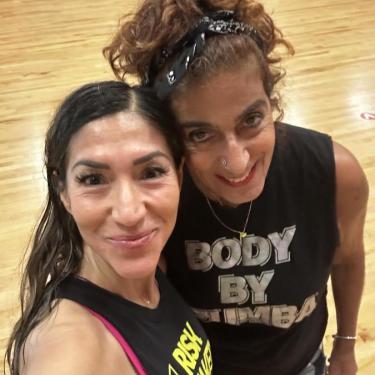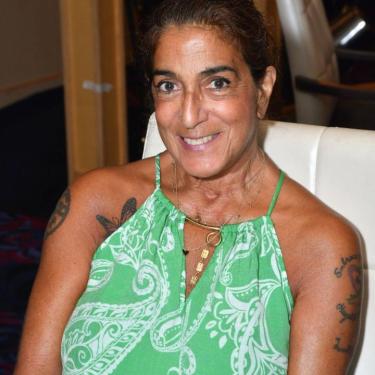
Our Woman of the Week is Tamara Gabriel, nominated for her work as the founder of the nonprofit Healing Hugs. Her story is not an easy one, and it contains content about losing a child, recovering from substance abuse, and domestic violence. She’s had a long and winding road to get to where she is today, and we asked her to tell you about it. You see her here in a recent photo with her husband:
“After I left my first husband years ago, I came to realize that I had been a battered woman. I joined a support group, went to therapy, and began trying to rebuild my life. A few months later, tragedy struck when I was in a car accident that took my daughter’s life.
“The Church is meant to be a hospital, a place of healing. But after my daughter’s death, no one from my church reached out. I had to search deeply to find out who I was in the eyes of God. I felt as though the one person who had loved me unconditionally was gone, and so I had to learn to love myself unconditionally—through God’s love. Around that time, I read an article by Elisabeth Kübler-Ross, where she shared that people at the end of life often say we are here for three reasons: to learn unconditional love—for ourselves and others—along with forgiveness and acceptance.
“Between therapy, recovery, and getting sober, I began learning about boundaries and how to trust my gut. I realized that the way I had been treated wasn’t okay. I started doing service work in jails and later in treatment centers, but it was often too traumatic for me. At the same time, my family essentially disowned me because I wasn’t living life on their terms. I was completely alone in my grief—even my son turned against me, so he went to live with his dad. I was left entirely by myself and had to figure out how to survive. That loneliness was one reason I reached out to women in jail—I didn’t want them to feel, as I had, that no one cared.
“It was during that work that I met my husband, who is a psychiatrist. At the time, I was working with women who were exchanging sex for drugs, helping them learn about self-care, boundaries, and healing. When my husband eventually started his own practice, I suggested we begin a women’s group together. That group, which I led for nearly 20 years, was called Women’s Original Wisdom. Our focus was on helping women reconnect with their intuition—the wisdom they had lost through trauma, dysfunctional families, or simply through being taught not to trust themselves. I wanted to teach them to recognize and trust their instincts again. So many of us lose that, and it seems to get passed down through generations.
“I realized I couldn’t wait for anyone else to give that to me. I had to learn it for myself. That’s what inspired me to start a nonprofit called Healing Hugs, which helps parents who have lost a child. We provide support with funeral and other expenses, therapy costs, and even gift cards so parents can buy Christmas presents for their surviving children. Sometimes it’s car payments, rent, or simply whatever necessities they need in those first, devastating months.”
Axia!
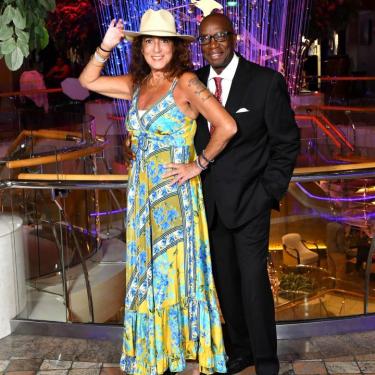
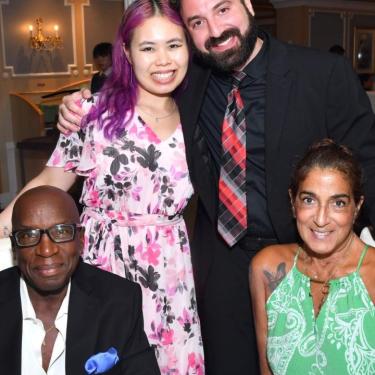
Tamara Gabriel is our Woman of the Week, nominated for her work with the organization Healing Hugs. We asked her what she wanted you to know about how to approach someone who has lost a child. You see her here with one of Healing Hugs’ angel moms, and also at an event with her husband, her son, and his girlfriend:
“The name Healing Hugs came from a poem I wrote. In it, I wanted to teach people how to respond to someone who has lost a child. When there’s nothing to say, I wrote, just give us a hug. That’s really the heart of it: empathy and compassion. I wanted Healing Hugs to embody those values—unconditional love, forgiveness, and compassion. I want people to be able to own truth, to know they are loved, and to remember that they are children of God.
“Sometimes I feel like God gave me everything and then took it all away, and I had to find a place to put that grief and pain. I think of the story of Job. I lost so much, but I can still see how I’ve been blessed. I have an amazing husband who understands me, accepts me, stands by me, and loves me. And I have my son. For years, he struggled with addiction and had trouble connecting with me. I had to set firm boundaries, show tough love, and pray for him constantly. At 22, he turned his life around. One day, he called me and said, “Mom, I was going to be dead by 25, homeless, and a sociopath.” I believe those prayers—and those boundaries—helped soften his heart. What happened to him was nothing short of a total psychic change, which to me is a miracle.
“In sharing all of this, my hope is simple: that my story might help someone else who is going through something similar.”
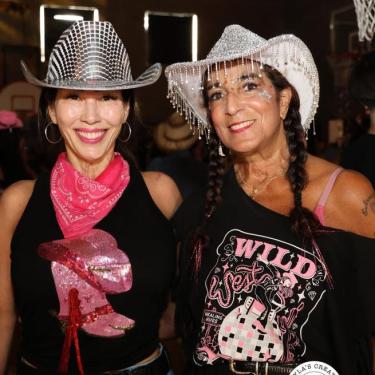
As always, we asked our Woman of the Week, Tamara Gabriel, to share her morning routine. You see her here with a friend at the Wild West disco:
“I have a gratitude practice. Sometimes my husband and I sit in the hot tub and pray—for the world, for people we know, for our patients, for anyone who comes to mind. But often I practice gratitude through Zumba. After everything my body has been through—the car accident, multiple surgeries, and now an autoimmune connective tissue disease—simply being able to move is something I don’t take for granted. Dancing is my way of saying thank you. Gratitude isn’t just in my prayers; it’s in the steps, the music, the joy of moving.
“That’s why Zumba has become so meaningful in my life and in the work of Healing Hugs. Every July, during Parent Bereavement Month—the same month my daughter died—we host a Zumba fundraiser. Each year, we select a theme: last year, it was the ’80s, and this year, our 10th anniversary, we went all out with a Wild West Disco. It’s a way to transform grief into movement, remembrance into joy. For me, it’s gratitude in action.
“The night before, I always bake—because baking, too, is a kind of therapy. I bring trays of homemade treats, and we add food trucks, raffle prizes, and of course, hours of dancing. 100% of the proceeds go back to Healing Hugs. Last year, we raised $17,000, all of it used to help parents with funeral expenses after the loss of a child.
“It’s a happy event born out of sadness. Even in grief, the body can celebrate, the heart can give, and a community can come together to love and support one another.”
Thank you, Tamara!
